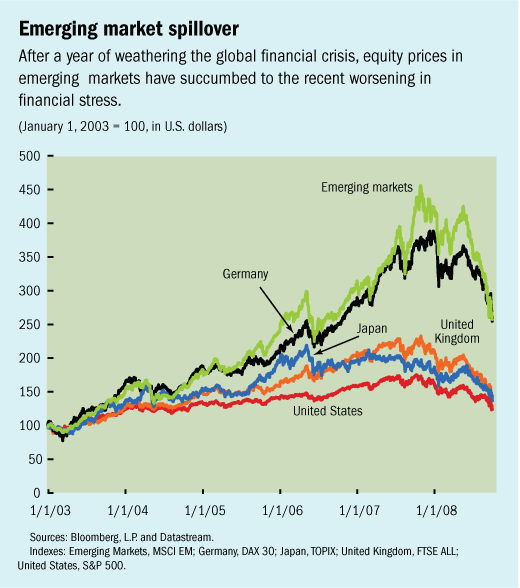
Typical street scene in Santa Ana, El Salvador. (Photo: iStock)
IMF Survey: Emerging Equity Markets Pulled Into Global Crisis
October 7, 2008
- Emerging equity markets vulnerable to changes in external conditions
- Movements in emerging market stock prices have small impact on real economy
- IMF advises policies to make emerging capital markets more resilient
After more than a year of relatively small spillovers from the financial turmoil in advanced economies, equity prices in emerging markets succumbed to the dramatic worsening of financial distress in mid-September 2008.

Deteriorating world economic conditions will increase stress on emerging economies' equity markets, IMF study says (photo: Paulo Whitaker/Reuters)
GLOBAL FINANCIAL STABILITY REPORT
Still, in early October, despite their steep and abrupt declines, emerging equity prices as a group were still well above their level at the beginning of their rally in the early part of this decade (see chart).
Moreover, unlike in past crises, the size of the spillover has not been uniform, reflecting the deepening of these markets, the different economic fundamentals among emerging market economies, and the growth of South-South cross-border investment, which helps insulate them from investor concerns in mature economies. The equity price declines, however, are likely not over.
Stress increases
A worsening global financial picture and deteriorating world economic conditions will increase the stress on these countries and their equity markets, the International Monetary Fund says in its latest Global Financial Stability Report.

Results from a study covering 30 countries indicate that emerging market equity prices are influenced by changes in global financial conditions, such as liquidity and credit and market risks, in addition to domestic fundamentals, such as growth and exchange rate expectations. Therefore, global factors constitute a significant channel for spillovers when the international economic environment changes.
In addition, financial integration has increased the correlation between advanced and emerging countries' equity markets in recent years, so that equity prices in all markets tend to move closer together.
Equity prices affect growth
Such global spillovers on emerging equity prices can, in turn, affect domestic private consumption and investment, although the links between financial markets and the real economy tend to play out more gradually than those within financial markets. The IMF analysis found increasing evidence of the so-called "wealth effect" of equity prices in emerging market economies, although not as pronounced as in mature market economies, where consumption and investment have long been affected by changes in equity prices.
Building resilience
To help withstand abrupt price fluctuations, emerging markets could help build and sustain resilient capital markets. Specifically, the policies that could help to make markets more resilient in the long run include:
• Fostering a broader and more diversified investor base to help deepen markets. Encourage a variety of investors, including institutional investors, such as pension funds and insurance companies, which tend to have long-term investment horizons. Longer-horizon investors can provide a buffer against any reversal of foreign equity inflows.
• Aiding price discovery. Remove impediments to price discovery by avoiding artificial delays in revealing prices or limiting price movements.
• Supporting financial infrastructure development. Adopt legal, regulatory, and prudential rules that conform with international best practice.
• Developing stock exchanges. A well-functioning exchange environment and supporting financial infrastructure for trading equities and new financial instruments can help price discovery, foster liquidity, and generally improve efficiency. Careful implementation, however, is important at every stage. Enhancements and financial innovation need to be properly timed and sequenced, with appropriate oversight in place, so as to reap the full benefits of innovation, while managing the risks to financial stability and ensuring the proper functioning of markets, the IMF said.
Comments on this article should be sent to imfsurvey@imf.org


